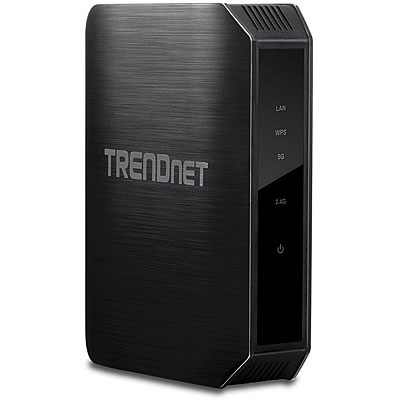Product Description
TRENDnet AC1200 WiFi Range Extender / Access Point
TRENDnet’s high performance AC1200 Dual Band Wireless Access Point, model TEW-814DAP, supports Access Point (AP), Client, Repeater, Wireless Distribution System (WDS) Bridge, and WDS + AP modes. The TEW-814DAP generates concurrent 867 Mbps Wireless AC and 300 Mbps Wireless N networks. Embedded GREENnet technology reduces power consumption by up to 50%.
Main uses:
- Range Extender: Extends the range of an existing Wi-Fi network or hotspot
- Access Point / Wired Network Converter: Provides wireless network connectivity to wired Ethernet devices
- Wireless Bridge: Wirelessly connects 2 or more network segments
- Minimize Mobile Broadband Data Consumption: In areas where public Wi-Fi is available (and/or Mobile Broadband is not) simply connect the Range Extender to the Mobile Broadband Router (i.e. Cradlepoint Routers), and switch your internet source from Mobile Broadband to Public Wi-Fi without changing settings on multiple connected laptops, smartphones, etc.
Features:
- Next Generation Wireless AC: 802.11ac provides uninterrupted HD video streaming in a busy connected environment
- Simultaneous Dual Band: High performance 867 Mbps Wireless AC + 300 Mbps Wireless N bands
- Wireless Coverage: Extended wireless coverage with MIMO antenna technology
- Compatibility: Compatible with legacy wireless devices
- Gigabit LAN port maintains high performance connections to the wired network
- Multi-Mode Support: Supports Access Point (AP), Client, Repeater, Wireless Distribution System (WDS), and WDS + AP modes
- One Touch Connection: Securely connect to the access point at the touch of the Wi-Fi Protected Setup (WPS) button
- Multi Language Interface: English, Spanish, French, German, and Russian
- Real time logs and statistics help trouble shooting
- Encrypted Wireless: Support for wireless encryption of up to WPA2
- Multiple SSIDs: Create up to four SSIDs per wireless band
- Energy Savings: Embedded GREENnet technology reduces power consumption
- IPv6 network support
- Targeted Beamforming: Increased real-time performance by directing stronger wireless signals to your specific location
Specifications:
Hardware
- Hardware Interface: 1 x Gigabit port
- LED indicators: Power switch, WPS button
-
Power:
- Input: 100 – 240 V AC, 50 - 60 Hz, 0.5 A
- Output: 12 V DC, 1 A external power adapter
- Consumption: 8.8 Watts (max.)
- Operating Temperature: 0 – 40 °C (32 – 104 °F)
- Operating Humidity: Max. 95% non-condensing
- Dimensions: 45 x 120 x 164 mm (1.8 x 4.7 x 6.5 in.)
- Weight: 260 g (9.2 oz.)
Wireless
- SSID: Up to 4 SSIDs per band (AP mode)
- Standards: IEEE 802.3, IEEE 802.3u, IEEE 802.3ab, IEEE 802.3az, IEEE 802.11a, IEEE 802.11b, IEEE 802.11g, IEEE 802.11n (up to 300 Mbps), IEEE 802.11ac (up to 867 Mbps)
-
Modulation:
- 802.11b: CCK, DQPSK, DBPSK
- 802.11a/g/n: BPSK, QPSK, 16 QAM, 64 QAM sub carrier with OFDM
- 802.11ac: BPSK, QPSK, 16 QAM, 64 QAM, 256 QAM with OFDM
-
Antenna Gain:
- 5 GHz: 5.88 dBi (max.) internal
- 2.4 GHz: 6.32 dBi (max.) internal
-
Access Control:
- Wireless encryption: WEP, WPA/WPA2-PSK, WPA/WPA2-RADIUS (AP mode)
- Access Controls: MAC Filter
-
Frequency:
- 5 GHz: FCC 5.180 – 5.240 + 5.745 – 5.825, ETSI: 5.180 – 5.240 GHz
- 2.4 GHz: FCC 2.412 – 2.472, ETSI: 2.412 – 2.462 GHz
-
Wireless Channel:
- 5 GHz: FCC: 36, 40, 44, 48, 149, 159, 157, 161 and 165, ETSI: 36, 40, 44, 48
- 2.4 GHz: FCC: 1 - 11, ETSI: 1 - 13
-
Wireless Output Power/Receiving Sensitivity:
- 802.11a: FCC: 20 dBm, CE: 22 dBm (max.)/-73 dBm (typical) @ 54 Mbps
- 802.11b: FCC: 24 dBm, CE: 13 dBm (max.)/-84 dBm (typical) @ 11 Mbps
- 802.11g: FCC: 22 dBm, CE: 14 dBm (max.)/-70 dBm (typical) @ 54 Mbps
- 802.11n (2.4 GHz): FCC: 22 dBm, CE: 14 dBm (max.)/-66 dBm (typical) @ 300 Mbps
- 802.11n (5 GHz): FCC: 20 dBm, CE: 22 dBm (max.)/-66 dBm (typical) @ 300 Mbps
- 802.11ac: FCC: 18 dBm, CE: 21 dBm (max.)/-56 dBm (typical) @ 867 Mbps
Package Contents:
- TEW-814DAP
- Multi-Language Quick Installation Guide
- CD-ROM (User’s Guide)
- Network cable (1.5 m/5 ft.)
- Power adapter (12 V DC, 1 A)
Documentation:
Wireless AC vs. Wireless N
Compatibility
Various network devices with an Ethernet connection or that utilize wireless AC or N standards





